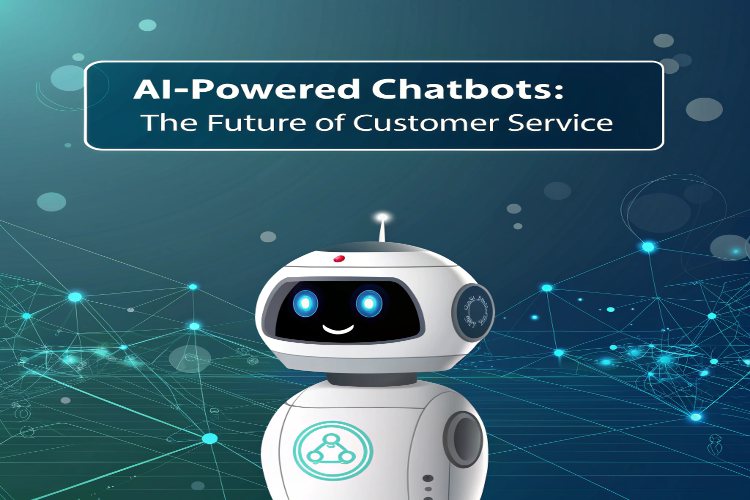Blog
AI-Powered Chatbots: The Future of Customer Service .
Technology & Innovation ▪ 2025-03-07

In today’s digital age, customer service is evolving rapidly, with AI-powered chatbots transforming the way businesses interact with customers. Companies are leveraging artificial intelligence to provide instant responses, improve customer satisfaction, and enhance overall service efficiency. AI-driven chatbots not only reduce operational costs but also ensure 24/7 availability, making them an essential tool for businesses aiming to scale customer support.
As AI technology continues to advance, chatbots are becoming more intelligent, offering personalized and human-like interactions. This blog explores how AI-powered chatbots are shaping the future of customer service, their key benefits, challenges, and what businesses can expect in the coming years.
The Rise of AI-Powered Chatbots in Customer Service
1. Instant Support and 24/7 Availability
One of the most significant advantages of AI chatbots is their ability to provide immediate responses. Unlike human agents who have limited working hours, AI chatbots operate round the clock, ensuring customers receive instant assistance anytime, anywhere. This reduces wait times and enhances the overall customer experience.
2. Personalized Customer Interactions
With advancements in Natural Language Processing (NLP) and machine learning, AI chatbots can analyze customer data and provide personalized responses. These chatbots remember past interactions, preferences, and behaviors to deliver a more tailored experience, making customers feel valued and understood.
3. Cost-Effective Customer Support
AI-powered chatbots help businesses reduce operational costs by handling repetitive queries and automating routine tasks. This reduces the need for large customer service teams, allowing businesses to allocate resources more efficiently while maintaining high-quality support.
4. Multilingual Support for a Global Audience
As businesses expand globally, language barriers can become a challenge. AI chatbots equipped with multilingual capabilities can communicate with customers in different languages, ensuring seamless interactions across diverse demographics.
5. Seamless Integration with CRM and Support Systems
AI chatbots can integrate with customer relationship management (CRM) platforms, helpdesk software, and other business tools to streamline customer interactions. This integration allows chatbots to access customer history and provide accurate responses, improving service efficiency.
How AI-Powered Chatbots Work
AI chatbots rely on machine learning, NLP, and data analytics to understand and respond to user queries. Here’s how they function:
1. Natural Language Processing (NLP)
NLP enables chatbots to comprehend and interpret human language, allowing them to process customer queries, extract relevant information, and generate meaningful responses.
2. Machine Learning Algorithms
Machine learning allows chatbots to improve over time by analyzing past interactions and learning from customer behavior. This continuous learning process helps enhance accuracy and response quality.
3. Sentiment Analysis
Advanced AI chatbots use sentiment analysis to detect customer emotions based on text inputs. This helps in understanding customer frustration or satisfaction levels, enabling businesses to provide more empathetic responses.
4. Voice Recognition and Conversational AI
With the rise of voice assistants like Alexa and Siri, AI chatbots are now equipped with voice recognition capabilities. This allows customers to interact with chatbots using voice commands, making customer support more convenient.
Benefits of AI-Powered Chatbots in Customer Service
1. Faster Response Times
AI chatbots can handle multiple queries simultaneously, ensuring customers receive prompt assistance without delays.
2. Reduced Human Errors
Unlike human agents who may provide inconsistent answers, AI chatbots maintain accuracy and deliver precise information consistently.
3. Scalability for Growing Businesses
As businesses grow, customer support demands increase. AI chatbots can easily scale without the need for hiring additional support staff.
4. Increased Customer Satisfaction
By providing instant, accurate, and personalized responses, AI chatbots enhance customer satisfaction and loyalty.
5. Lead Generation and Sales Support
AI chatbots assist businesses in capturing leads, answering product-related queries, and guiding customers through the sales funnel.
Challenges and Limitations of AI Chatbots
1. Lack of Human Touch
While AI chatbots are improving, they still lack the emotional intelligence and empathy that human agents provide.
2. Difficulty Handling Complex Queries
Chatbots are effective for handling simple and frequently asked questions but may struggle with complex issues that require human intervention.
3. Privacy and Security Concerns
With AI chatbots handling sensitive customer data, businesses must ensure robust security measures to prevent data breaches and cyber threats.
4. High Initial Implementation Costs
Developing and integrating AI chatbots requires investment in technology, infrastructure, and training.
Future Trends in AI-Powered Customer Service
1. Hyper-Personalization
Future AI chatbots will leverage advanced analytics and AI-driven insights to provide highly personalized interactions, enhancing user experience.
2. Voice-Enabled AI Chatbots
As voice technology advances, more businesses will integrate voice-enabled AI chatbots for hands-free customer support.
3. AI Chatbots with Emotional Intelligence
The next generation of AI chatbots will be equipped with emotional intelligence, allowing them to detect and respond to human emotions more effectively.
4. Omnichannel AI Chatbot Support
AI-powered chatbots will be integrated across multiple platforms, including websites, social media, messaging apps, and smart devices, ensuring seamless interactions across all channels.
5. AI and Human Collaboration
AI chatbots will work alongside human agents, handling routine inquiries while allowing human representatives to focus on more complex and personalized interactions.

